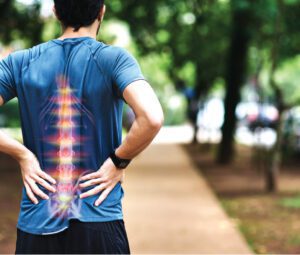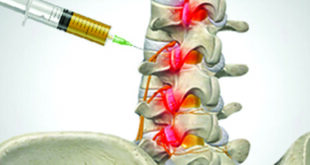 If you have persistent pain for six months or more, it’s considered chronic. By that point, you may have tried just about everything to find relief, but you know you don’t want to undergo even more painful surgery or take medication for the rest of your life. What do you do?
If you have persistent pain for six months or more, it’s considered chronic. By that point, you may have tried just about everything to find relief, but you know you don’t want to undergo even more painful surgery or take medication for the rest of your life. What do you do?
Navdeep Jassal, MD, of the Spine & Pain Institute of Florida in Lakeland, Florida offers a minimally invasive treatment called spinal cord stimulation to get rid of your relentless pain.
What is spinal cord stimulation?
If your chronic back pain hasn’t responded well to chiropractic care, physical therapy, massage therapy, or injections, spinal cord stimulation is an advanced option for your complex condition. The treatment involves the use of low-grade electrical pulses that interrupt the way your nerves transmit pain throughout your body and the way your brain receives and processes those pain signals.
Candidates for spinal cord stimulation
Before you get the green light to receive a spinal cord stimulator, Dr. Jassal uses a temporary device to conduct a trial. If your pain lessens during the trial period, it’s likely that you’re a good candidate for permanent placement of a stimulator. The weeklong test period is also a great time for you to see how you feel with the wires and if you think you’re getting adequate relief.
As with all pain management solutions, Dr. Jassal conducts a thorough physical exam, runs tests, and talks to you about your health history before he makes any recommendations.
How is a spinal cord stimulator installed?
After you pass through the trial phase and determine that you can benefit from spinal cord stimulation, you’ll come into our pain management clinic for permanent implantation of your spinal cord stimulator.
During the short outpatient procedure, a member of our team positions you on your stomach and delivers a local anesthetic to make you comfortable. Then, Dr. Jassal makes a tiny incision in your back and places an ultra-thin electrical wire in the epidural space in your spine. He guides the microscopic wire to a second incision near your waist. There he hooks the wire to a small generator, or stimulator, that he leaves in place under your skin. Once your incision is closed, you can sit up and relax until you go home. You’ll leave with a small remote to control and adjust your stimulator and help regulate the pain. Our team explains everything you need to know about how to operate your spinal cord stimulator.
What are the side effects?
Adverse effects are rare. Most problems with spinal cord stimulator placement have to do with the surgical procedure itself, which can lead to bleeding or infection. Some patients report pain at the surgical site for a few days following the implant, but it typically subsides on its own. We’ll go over the risks and possible complications so you’ll know exactly what to expect.
What kind of results can I expect?
For more than 50 years, spinal cord stimulation has helped thousands of men and women. In fact, since its inception, nearly 300,000 stimulator recipients have seen their pain greatly reduced and their quality of life improve. Many people report immediate relief after the implant, while it takes others a few days or weeks to adjust and customize the stimulator’s settings to get optimal relief.
The team at Spine & Pain Institute of Florida walks with you through each phase of your therapy, from trial to implant to living with neurostimulation. We’ll check up on you regularly and help you make the most of your spinal cord stimulator.
Get drug-free relief for your chronic back pain and get your life back. Call our office or use the online booking feature to see if you’re a candidate for spinal cord stimulation.
About Dr. Jassal
If you want an award-winning expert who offers the latest treatments to reduce pain, look no further than Navdeep Jassal, MD. At his practice, Spine & Pain Institute of Florida, located in Lakeland, Florida, Dr. Jassal treats a wide variety of pain types with comprehensive, personalized, evidence-based care.
Dr. Jassal started his medical education at the University of California, San Diego, where he earned his bachelor of science in biology. He then continued onto Ross University School of Medicine in Dominica, West Indies, completing his Doctor of Medicine degree. He completed his physical medicine and rehabilitation residency at the Zucker School of Medicine at Hofstra/Northwell in Great Neck, New York, and was elected chief resident during his final year. Dr. Jassal then rounded out his medical training with a pain medicine fellowship at the University of South Florida Morsani College of Medicine in Tampa, Florida.
Today, Dr. Jassal is certified by the American Board of Physical Medicine and Rehabilitation in both pain medicine and physical medicine and rehabilitation. He leverages his pain medicine specialty to help patients manage even the most complex pain.
Dr. Jassal treats chronic and acute pain, including cancer pain, neurological pain, and musculoskeletal pain. To do this, he offers each patient a personalized interventional treatment plan that may include tailored physical therapy, medication, and procedures like implantable spinal cord stimulators, intrathecal drug delivery systems, lumbar decompression, minimally invasive sacroiliac joint fusion and more.
When he’s not treating patients, Dr. Jassal extends his expertise to others. He serves as an assistant professor for the Department of Physical Medicine & Rehabilitation at the University of Central Florida as well as an assistant clinical professor for the University of South Florida’s pain medicine fellowship. He is also actively involved in research to uncover new, minimally invasive ways to treat spinal pain.
Dr. Jassal is an award-winning physician. In the Tampa edition of Top Doctor, he was voted the #1 Tampa pain physician in 2018 and was runner up in 2019. The University of South Florida named him Pain Faculty Attending of the Year in 2018. In addition, he recently won first place at the annual meeting of the American Society of Interventional Pain Physicians for his research and consistently presents at regional and national conferences on his outcomes.
Spine & Pain Institute Florida
833-513-7246 (PAIN)
FAX: (863)-333-4007
www.spiflorida.com
 Central Florida Health and Wellness Magazine Health and Wellness Articles of the Villages
Central Florida Health and Wellness Magazine Health and Wellness Articles of the Villages



